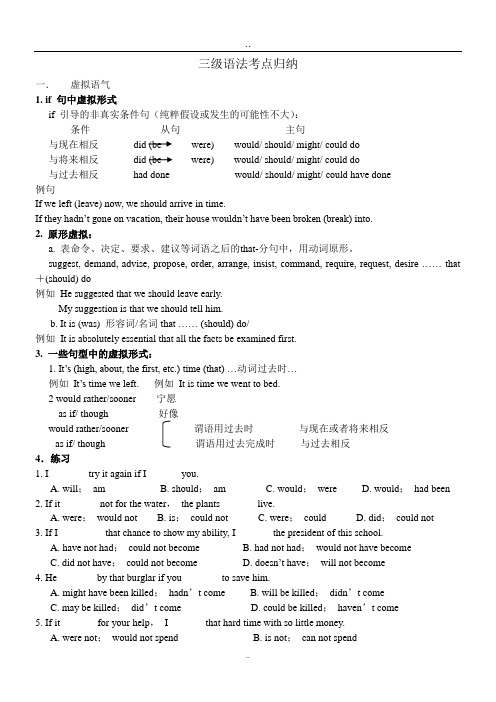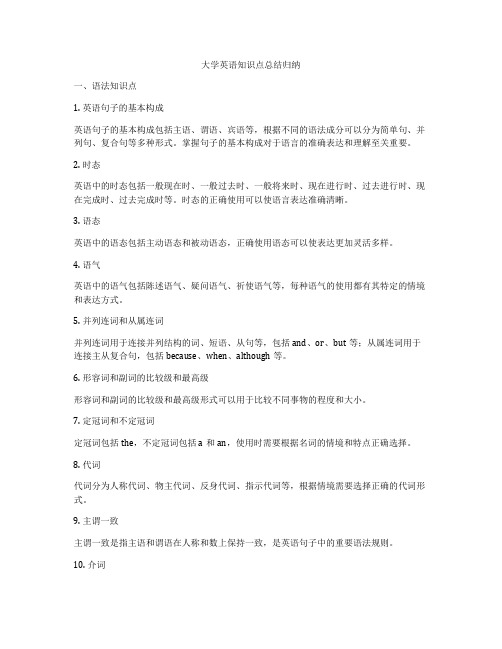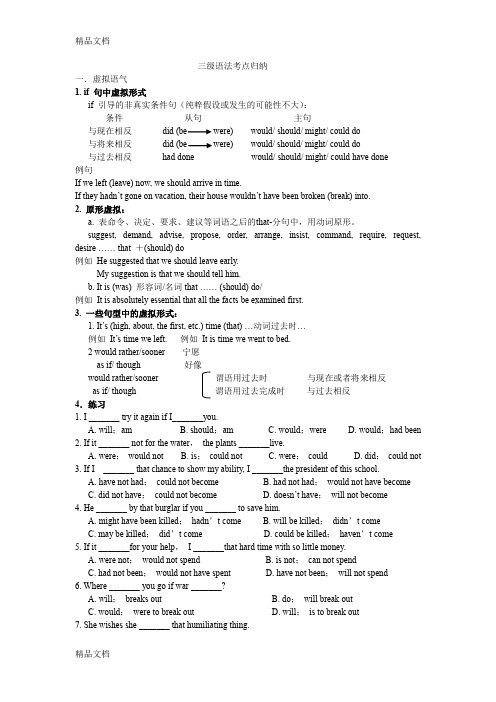大学英语语法归纳总结
- 格式:doc
- 大小:250.00 KB
- 文档页数:34

三级语法考点归纳一.虚拟语气1. if 句中虚拟形式if 引导的非真实条件句(纯粹假设或发生的可能性不大):条件从句主句与现在相反did (be were) would/ should/ might/ could do与将来相反did (be were) would/ should/ might/ could do与过去相反had done would/ should/ might/ could have done例句If we left (leave) now, we should arrive in time.If they hadn’t gone on vacation, their house wouldn’t have been broken (break) into.2. 原形虚拟:a. 表命令、决定、要求、建议等词语之后的that-分句中,用动词原形。
suggest, demand, advise, pr opose, order, arrange, insist, command, require, request, desire …… that +(should) do例如He suggested that we should leave early.My suggestion is that we should tell him.b. It is (was) 形容词/名词that …… (should) do/例如It is absolutely essential that all the facts be examined first.3. 一些句型中的虚拟形式:1. It’s (high, about, the first, etc.) time (that) …动词过去时…例如It’s time we left.例如It is time we went to bed.2 would rather/sooner 宁愿as if/ though 好像would rather/sooner 谓语用过去时与现在或者将来相反as if/ though 谓语用过去完成时与过去相反4.练习1. I _______ try it again if I_______you.A. will;amB. should;amC. would;wereD. would;had been2. If it _______ not for the water,the plants _______live.A. were;would notB. is;could notC. were;couldD. did;could not3. If I _______ that chance to show my ability, I _______the president of this school.A. have not had;could not becomeB. had not had;would not have becomeC. did not have;could not becomeD. doesn’t have;will not become4. He _______ by that burglar if you _______ to save him.A. might have been killed;hadn’t comeB. will be killed;didn’t comeC. may be killed;did’t comeD. could be killed;haven’t come5. If it _______for your help,I _______that hard time with so little money.A. were not;would not spendB. is not;can not spendC. had not been;would not have spentD. have not been;will not spend6. Where _______ you go if war _______?A. will;breaks outB. do;will break outC. would;were to break outD. will;is to break out7. She wishes she _______ that humiliating thing.A. doesn’t doB. didn’t doC. haven’t doneD. hadn’t done8. The chairman suggested that the meeting _______ put off.A. can beB. beC. isD. will be9. It is vital that he _______ immediately.A. should goB. must goC. goesD. went10. It is time we _______do our homework.A. begin toB. can begin toC. began toD. will begin to答案:1.选C。

大学英语知识点总结归纳一、语法知识点1. 英语句子的基本构成英语句子的基本构成包括主语、谓语、宾语等,根据不同的语法成分可以分为简单句、并列句、复合句等多种形式。
掌握句子的基本构成对于语言的准确表达和理解至关重要。
2. 时态英语中的时态包括一般现在时、一般过去时、一般将来时、现在进行时、过去进行时、现在完成时、过去完成时等。
时态的正确使用可以使语言表达准确清晰。
3. 语态英语中的语态包括主动语态和被动语态,正确使用语态可以使表达更加灵活多样。
4. 语气英语中的语气包括陈述语气、疑问语气、祈使语气等,每种语气的使用都有其特定的情境和表达方式。
5. 并列连词和从属连词并列连词用于连接并列结构的词、短语、从句等,包括and、or、but等;从属连词用于连接主从复合句,包括because、when、although等。
6. 形容词和副词的比较级和最高级形容词和副词的比较级和最高级形式可以用于比较不同事物的程度和大小。
7. 定冠词和不定冠词定冠词包括the,不定冠词包括a和an,使用时需要根据名词的情境和特点正确选择。
8. 代词代词分为人称代词、物主代词、反身代词、指示代词等,根据情境需要选择正确的代词形式。
9. 主谓一致主谓一致是指主语和谓语在人称和数上保持一致,是英语句子中的重要语法规则。
10. 介词介词用于连接名词、代词、动词或形容词等,构成介词短语用于修饰其他成分,掌握介词的使用可以使语言表达更加丰富。
二、词汇知识点1. 单词的拼写和发音掌握英语单词的拼写和发音是学习英语的基本功,有助于提高语言表达的准确性。
2. 同义词和反义词同义词和反义词可以丰富语言表达的方式,帮助学习者避免重复使用相同的词汇。
3. 词汇搭配词汇搭配是指在语言表达中,词语之间常常有固定的搭配关系,如动词搭配介词、名词搭配形容词等,掌握词汇搭配可以使表达更加自然流畅。
4. 词义辨析英语中存在大量近义词和异义词,学习者需要掌握它们的区别和正确用法,避免混淆。

大学英语语法总结(全面)大学英语语法总结(全面完整版)1. 介词(Prepositions)- 表示地点:at, in, on- 表示时间:at, in, on- 表示方式:by, with- 表示原因:because of, due to- 表示目的:for, to2. 冠词(Articles)- 定冠词:the- 不定冠词:a, an3. 代词(Pronouns)- 主格代词:I, you, he, she, it, we, they- 宾格代词:me, you, him, her, it, us, them- 所有格代词:my, your, his, her, its, our, their- 反身代词:myself, yourself, himself, herself, itself, ourselves, themselves4. 名词(Nouns)- 单数名词:book, chair, dog- 复数名词:books, chairs, dogs- 不可数名词:water, money, information5. 动词(Verbs)- 一般现在时:I walk, you walk, he/she/it walks, we walk, they walk- 一般过去时:I walked, you walked, he/she/it walked, we walked, they walked- 现在进行时:I am walking, you are walking, he/she/it is walking, we are walking, they are walking- 过去进行时:I was walking, you were walking, he/she/it was walking, we were walking, they were walking- 一般将来时:I will walk, you will walk, he/she/it will walk, we will walk, they will walk6. 形容词(Adjectives)- 描述名词特征:big, small, tall- 比较级:bigger, smaller, taller- 最高级:biggest, smallest, tallest7. 副词(Adverbs)- 表示方式:quickly, slowly- 表示程度:very, extremely- 表示时间:now, yesterday8. 连词(Conjunctions)- 表并列:and, or- 表递进:furthermore, moreover- 表转折:however, but- 表原因:because, since以上是大学英语语法的简要总结,希望对你有帮助。

三级语法考点归纳一.虚拟语气1. if 句中虚拟形式if 引导的非真实条件句(纯粹假设或发生的可能性不大):条件从句主句与现在相反did (be were) would/ should/ might/ could do与将来相反did (be were) would/ should/ might/ could do与过去相反had done would/ should/ might/ could have done例句If we left (leave) now, we should arrive in time.If they hadn’t gone on vacation, their house wouldn’t have been broken (break) into.2. 原形虚拟:a. 表命令、决定、要求、建议等词语之后的that-分句中,用动词原形。
suggest, demand, advise, propose, order, arrange, insist, command, require, request, desire …… that +(should) do例如He suggested that we should leave early.My suggestion is that we should tell him.b. It is (was) 形容词/名词that …… (should) do/例如It is absolutely essential that all the facts be examined first.3. 一些句型中的虚拟形式:1. It’s (high, about, the first, etc.) time (that) …动词过去时…例如It’s time we left.例如It is time we went to bed.2 would rather/sooner 宁愿as if/ though 好像would rather/sooner 谓语用过去时与现在或者将来相反as if/ though 谓语用过去完成时与过去相反4.练习1. I _______ try it again if I_______you.A. will;amB. should;amC. would;wereD. would;had been2. If it _______ not for the water,the plants _______live.A. were;would notB. is;could notC. were;couldD. did;could not3. If I _______ that chance to show my ability, I _______the president of this school.A. have not had;could not becomeB. had not had;would not have becomeC. did not have;could not becomeD. doesn’t have;will not become4. He _______ by that burglar if you _______ to save him.A. might have been killed;hadn’t comeB. will be killed;didn’t comeC. may be killed;did’t comeD. could be killed;haven’t come5. If it _______for your help,I _______that hard time with so little money.A. were not;would not spendB. is not;can not spendC. had not been;would not have spentD. have not been;will not spend6. Where _______ you go if war _______?A. will;breaks outB. do;will break outC. would;were to break outD. will;is to break out7. She wishes she _______ that humiliating thing.A. doesn’t doB. didn’t doC. haven’t doneD. hadn’t done8. The chairman suggested that the meeting _______ put off.A. can beB. beC. isD. will be9. It is vital that he _______ immediately.A. should goB. must goC. goesD. went10. It is time we _______do our homework.A. begin toB. can begin toC. began toD. will begin to答案:1.选C。


英语语法的用法归纳总结嘿,同学们!咱们今天来好好聊聊英语语法这回事儿。
先说说我自己的一个经历吧。
有一次我在国外旅行,走进一家咖啡店想买杯咖啡提提神。
我对服务员说:“I want a coffee” 结果服务员一脸懵地看着我,然后问我:“What kind of coffee do you want?” 我当时就有点蒙圈了,才反应过来自己说得太简单啦,没有把想要的咖啡种类说清楚。
这可让我尴尬了好一会儿,也让我深刻体会到语法准确的重要性。
咱们从最基础的开始,先来说说名词。
名词嘛,就是给各种东西起的名字,比如“apple”(苹果)、“book”(书)。
名词有可数和不可数之分,像“apple”就是可数的,一个苹果、两个苹果;而“water”(水)就是不可数的,不能说一个水、两个水,得说“a glass of water”(一杯水)、“two cups of water”(两杯水)。
再来讲讲动词。
动词就像是句子的发动机,让句子动起来。
比如“run”(跑)、“jump”(跳)。
动词有时态的变化,这可有点复杂啦。
一般现在时,比如“I play basketball every day” (我每天都打篮球。
)一般过去时,“I played basketball yesterday” (我昨天打了篮球。
)还有现在进行时,“I am playing basketball now” (我现在正在打篮球。
)这里面的变化可一定要记清楚,不然可就要闹笑话啦。
形容词和副词也很重要哦。
形容词是用来形容名词的,像“beautiful”(美丽的)、“big”(大的)。
副词则是用来形容动词、形容词或者其他副词的,比如“quickly”(快速地)、“very”(非常)。
比如说,“She runs fast” (她跑得很快。
)这里的“fast”就是副词。
还有代词,“I”(我)、“you”(你)、“he”(他)、“she”(她)这些都是常见的代词。
十大英语语法基础知识点归纳总结在学习英语的过程中,语法是一个非常重要的部分。
掌握好英语语法基础知识,不仅可以帮助我们正确地表达自己,还可以提高我们的英语水平。
下面,我将根据十大英语语法基础知识点,逐一进行总结和归纳,希望能够帮助大家更好地掌握这些知识。
1. 主谓一致主谓一致是指句子中的主语和谓语在人称和数上要保持一致。
在英语中,主谓一致是非常重要的语法规则,也是构成句子正确性的基础之一。
主语是第三人称单数时,谓语动词要加-s或-es。
2. 时态时态是表示动作或状态发生的时间的一种语法形式。
英语中有多种时态,包括一般现在时、一般过去时、一般将来时、现在进行时、过去进行时、将来进行时等。
掌握好各种时态的用法可以帮助我们准确地描述不同时间发生的动作或状态。
3. 名词复数名词复数是指表示两个或两个以上的个体、事物或概念的名词形式。
英语中名词复数的构成有规律可循,大多数名词在词尾加-s或-es就可以构成复数形式,但也有一些名词变化规律需要特别注意。
4. 冠词冠词是英语中用来限定名词的一种词类,包括定冠词“the”和不定冠词“a/an”。
冠词在句子中起着非常重要的限定作用,正确使用冠词可以让句子更加准确地表达出原意。
5. 代词代词是代替名词或名词词组的词语,用来避免重复或简化表达。
英语中的代词分为人称代词、物主代词、反身代词、指示代词、疑问代词、不定代词等多种类型,每种类型的代词都有着不同的用法和形式。
6. 动词时态和语态动词时态和语态是用来表示动作发生的时间和句子主语与谓语之间的关系。
英语中的动词时态包括一般现在时、一般过去时、一般将来时、现在进行时、过去进行时、将来进行时等,而语态则包括主动语态和被动语态。
7. 副词副词是用来修饰动词、形容词、副词或句子的成分,表示时间、地点、方式、原因、程度等。
在句子中,副词起着非常重要的修饰作用,可以让句子的表达更加生动和准确。
8. 介词介词是用来表示名词与其它词之间关系的一种虚词,包括表示时间、地点、方位、原因、目的等多种类型。
英语词汇语法归纳英语词汇与语法归纳英语词汇和语法是学习英语的基础,它们相互依存,共同构建了我们对英语的理解和应用能力。
在本文中,我将对英语词汇和语法进行归纳总结,帮助读者更好地掌握和运用英语。
一、英语词汇归纳1. 名词(Noun)名词是表示人、事、物、地点、抽象概念等的词,它通常可以单数和复数形式。
名词的形式变化有时根据规则进行,有时则需要记忆。
- 单数形式:book(书)、cat(猫)- 复数形式:books(书籍)、cats(猫咪)2. 动词(Verb)动词是表示动作、状态或存在的词。
英语动词有时态和语态的变化,也有不规则动词需要单独记忆。
- 时态变化:play(玩)→ played(玩过)→ will play(将要玩)- 语态变化:write(写)→ is written(被写)3. 形容词(Adjective)形容词是用来描述名词特征或性质的词,它可以放在名词前或后。
- 放在名词前:a beautiful girl(一个漂亮的女孩)- 放在名词后:the girl is beautiful(这个女孩很漂亮)4. 副词(Adverb)副词是用来修饰动词、形容词和其他副词的词,表示时间、地点、方式、程度等。
- 修饰动词:He speaks English fluently(他英语说得很流利)- 修饰形容词:She is extremely beautiful(她非常漂亮)5. 介词(Preposition)介词用于表示位置、方向、时间、方法等关系。
在句子中通常与其他词搭配使用。
- 位置关系:in the box(在盒子里)- 方向关系:go to school(去学校)- 时间关系:at 5 o'clock(在五点)二、英语语法归纳1. 时态(Tense)英语时态用来表示动作发生的时间。
常见的时态有一般现在时、一般过去时、一般将来时等。
- 一般现在时:I play football every day(我每天踢足球)- 一般过去时:I played football yesterday(昨天我踢了足球)- 一般将来时:I will play football tomorrow(明天我将踢足球)2. 语态(Voice)英语语态用来表示句子中动作的主动与被动关系。
英语语法知识点归纳英语语法是一门复杂的学科,通常被视为英语学习的基础。
因此,了解英语语法知识点和应用英语语法正确是提高英语水平的关键。
本文将归纳总结英语语法方面的基本知识,以供读者参考。
首先,英语语法中有两个最重要的知识点:格式和用法。
格式是指语法结构,它指明句子内部分词之间的关系。
格式通常由两个或三个成分组成:主语、谓语、宾语等。
用法指句子中动词、介词等词汇的合理用法,其中包括构造从句、使用介词等。
其次,英语语法还包括语态。
语态指动词的形式,它可以表述不同的语义,影响主语和谓语之间的关系。
英语有三种语态:主动语态、被动语态和一般现在时语态。
此外,英语语法中还有各种时态。
时态指语法结构中动词的形式,用来表示说话者所指的动作发生在过去、现在或将来。
英语有八种时态:一般现在时、一般过去时、现在进行时、过去进行时、将来时、将来进行时、现在完成时和过去完成时。
此外,英语语法还包括冠词、形容词、副词等语法知识。
冠词是一类修饰名词的词,如“a”、“an”和“the”。
形容词是一类修饰名词或其他形容词的词,如“big”、“small”和“beautiful”。
副词是一类修饰动词、形容词或其他副词的词,如“quickly”、“slowly”和“carefully”等。
最后,英语语法中还有一些“小知识”,例如连词、介词、助动词等。
连词是一类连接句子的词,如“and”、“but”和“so”等。
介词是一类修饰名词、代词和动词短语的词,如“in”、“on”和“of”等。
助动词是一类助助动谓语的词,如“will”、“can”和“shall”等。
总之,英语语法有诸多知识点,包括格式、用法、语态、时态、冠词、形容词、副词、连词、介词、助动词等。
上述这些知识点都是英语学习的基础,了解这些知识点,并能够熟练运用英语语法,对于学习英语有着重要的作用。
大一语法常考知识点总结一、基本句型1. 英语句子的基本构成是主语+谓语+宾语(SVO)结构。
例如:I study English.2. 英语中还可以出现其他附加成分,如状语和宾语补语等。
例如:She sings beautifully.(副词状语)I consider him a good friend.(宾语补语)二、时态1. 一般现在时:表示经常性或普遍性的动作或状态。
例如:I play tennis every Sunday.2. 一般过去时:表示过去发生的动作或状态。
例如:He watched a movie last night.3. 一般将来时:表示将来发生的动作或状态。
例如:We willgo to the beach tomorrow.4. 现在进行时:表示现在正在进行的动作。
例如:They are eating dinner right now.5. 过去进行时:表示过去某个时间点正在进行的动作。
例如:I was studying when she called me.6. 现在完成时:表示过去某个时间点发生的动作对现在造成的影响。
例如:I have finished my homework.7. 过去完成时:表示过去某个时间点之前已经完成的动作。
例如:She had already left when I arrived.三、非谓语动词1. 不定式:to + 动词原形。
可作为动词的补充,也可用作名词、形容词、副词等。
例如:I want to go to the park.2. 动名词:动词+ing形式。
表示动作或状态。
例如:I enjoy swimming in the sea.3. 分词:-ed形式(过去分词)和-ing形式(现在分词)。
用于构成完成时态、进行时态以及作形容词、副词等。
例如:The broken window needs to be fixed.四、虚拟语气1. 虚拟语气用于表示假设、愿望、建议、命令等情况。
一、大学英语三、四级语法归纳二、时态和语态I、时态◇时态是表示动作发生的时间和表现方式的一种动词形式。
每一种“时间+方式”就构成一种时态。
从时间上看,有现在、过去、将来和过去将来之分,从动作上看,有一般、进行、完成及完成进行之区别。
(英语动词有16种时态)在实际应用中以及TOEFL等考试中出现最多的时态也只有4种,即一般现在时,现在完成时,一般过去时及过去完成时。
◇1.用一般现在时表示将来的动作。
B.在由连词even if, unless, as soon as, if, when, in case, before, after, until, once, themoment, as long as等引出状语从句中,谓语一般不用will或shall来表示将来的动作,仅用一般现在时。
例如:C.eg. She will come to see you the moment she finishes her work.◇The boss won’t give the workers pay unless they ______their work today.(03/12, 43)D.A) finish B) finished C) will finish D) had finished◇Such crimes may be so complex that months or years go by before anyone__________ them.E.A) discovered B) will discover (03/1,31, CET-4)F.C) would have discovered D) discoversG. B. 某些表示起始的动词,可用一般现在时表示按预定计划或时刻表在短时间内将发生的动作。
这类动词有:be, go, come, start, leave, depart, arrive, begin, return等。
例如:◇The train leaves at five sharp.H. 2. 现在完成时、过去完成时以及将来完成时之间的区别1)现在完成时:I.①构成:have/has + 过去分词J.②语法意义及要点:A.表示一个过去开始的状态或动作持续到现在并可能继续持续下去,常同表示一段时间的状语连用。
eg. so far,up to now,since,for a long time etc.K.eg. He has worked as a teacher for many yearsL.Up till now,nothing has gone wrong.◇Don’t disturb Father. He ________ letters all morning and has written ten so far. (99/6, 42)M.A) write B) has been writing C) has written D) was writingN.◇This is the worst time of the year. It ________every day so far.(02/6, 42)O.A) is raining B) has rained C) rained D) rainsP.B.表示一个过去发生的对现在仍有影响的动作或事件。
常与不确定的过去时间状语连用(eg. yet,just,before,recently, etc.);也同表示频度时间状语连用(eg. often,ever,never,sometimes,several times, etc).;还可同包括现在时间在内的时间状语连用(eg.now,today,this morning, etc). 但不能同特定的过去时间状语连用(last year,inl997 etc.)Q.eg. I have never learned Japanese before.R.We have been quite busy lately /recently.S.◇I am meeting Ivan tonight; I _______a Russian before.(01/1,49)T.A) didn’t ever meet B) have ever met C) had never met D) have never metU.C.在时间或条件状语从句中,当表示将来完成时的意义时,要用现在完成时来代替将来完成时。
◇We'll start at 5 0'clock if it has stopped raining by then.◇I shall go to see you when I have finished my homework.V.Note:行为不能持续的瞬间动词(Instantaneous Verb),eg. arrive, begin, come, go,start, leave, die,join,etc. 通常不能用于这一语法意义,即该类动词在现完成时中不能与表示一段时间的状语连用。
◇He has joined the army for five years.(F)◇He has been in the army for five years。
(T)W.2) 过去完成时:X.①构成:had+过去分词Y.②语法意义及要点:表示某一动作或情况发生在过去某一时刻之前并持续到该时刻。
Z.eg. David and Jenny had known each other for a long time before their marriage. AA.T hey had got everything ready before the party began.◇The burglary ______before I arrived at the office; all I could do was to call the police. (03/6, 56)BB.A) has occurred B) had occurred C) was occurring D) would occurCC.N ote: 与现在完成时不同的是过去完成时可以与表示具体过去的时间状语连用。
◇He said that he had seen her the day before yesterday.DD.3) 将来完成时:EE.①构成:shall/will +have+过去分词FF.②语法意义及要点:表示某一动作在将来某一时刻或将来某一动作之前已经完成或发生。
GG.eg. He will have graduated from high school before his next birthday,HH.The shop will have closed already before you get there.II.◇By the end of next year they _________together for twenty years. (01/1,48) JJ.A) will have worked B) had worked C) would work D) have workedKK.◇--"May I speak to your manager Mr. Williams at five o'clock tonight?"(00/6,41, CET-4)--"I'm sorry. Mr. Williams _______ to a conference long before then."A) will have gone B) had gone C) would have gone D) has goneLL.◇By the time he arrives in Beijing, we_______ here for two days. (01/6,31, CET-4)A) have been staying B) have stayed C) shall stay D) will havestayedMM.◇By the time you get to New York, I _______for London. (02/1,41, CET-4)A) would be leaving B) am leaving C) have already left D) shall haveleftNN.4) 将来时间表示法:OO.①be going to +V. 表示不太明确的意图、打算。
◇We’re going to to build a new highway to the east.PP.②be + to + V. 表示正式的安排、指示、命令、禁止等。
例如:QQ.You’re to do your homework before you watch TV.◇You’re not to tell him anything about our plans.RR.③be about to / be on the point of 表示不久的将来,后者表示更近的将来,强调将来要发生的事情已临近。
例如:◇I feel that something terrible is about to happen.◇I can’t see you now. I’m on the point of leaving.SS.④be due to 表示将来的用法与时刻表、实施计划有关。
例如:◇The train to Hangzhou is due to arrive at 13:15.II、语态TT.英语动词有两种语态,一种叫主动语态(Active Voice),一种叫被动语态(Passive Voice), 分别表示主语和谓语动词的主动关系和被动关系。
.主动语态用于主动句,表示主语是动作的执行者;被动语态用于被动句,表示主语是动作的承受者。
UU.☆基本公式是:“是”动词+过去分词(被动语态有13种)VV.1. am/ is / are +P.P 2. am/ is / are +being +P.PWW. 3. was/ were +P.P 4. was/ were +being +P.PXX.5. has been + P.P 6. had + been + P.PYY.7. shall / will be + P.P 8. should / would be + P.PZZ.9. should / shall / would / must / need / may / might / ought toAAA./ can / could / will be+ P.P (情态动词)BBB.10. be +to be + P.P (不定式) 11. to have been + P.P (完成体)CCC.12 .being + P.P (动名词及分词) 13. having been +PP(完成时动名词及分词)☆动词不定式符号to的处理。